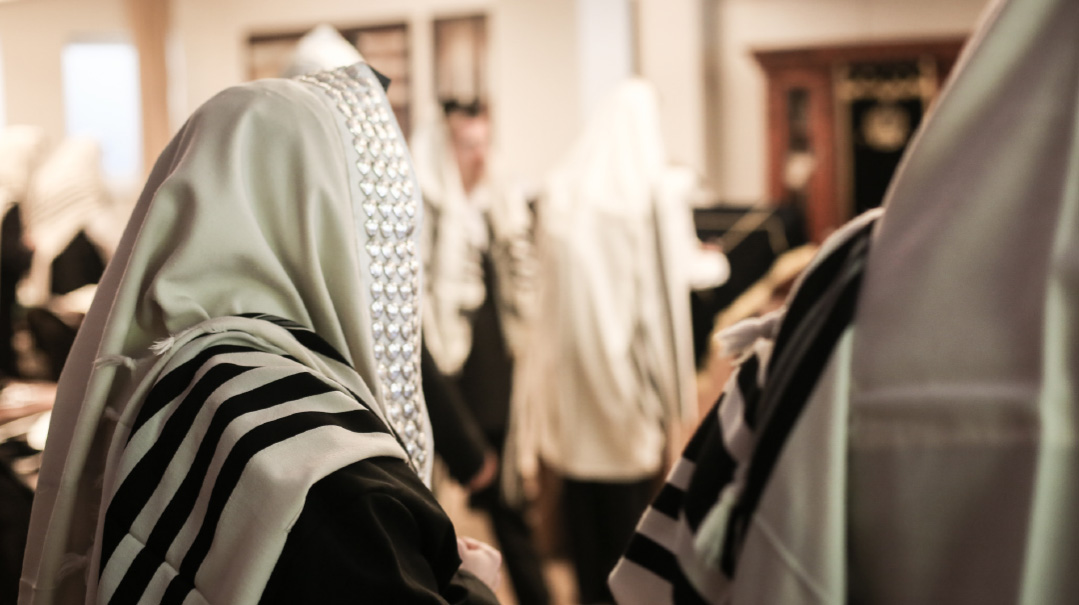The True Goal of Mesirus Nefesh
| September 19, 2023Put differently, true mesirus nefesh is not self-reduction; it is self-expansion, an opportunity to push oneself beyond the limits one assumes for oneself.
IS self-sacrifice a virtue?
Our instinctive answer to that question is, “But of course. It must be!” When we consider our overwhelming duties — the lion’s share of our time, money, and emotion that we pour into our Torah-driven lives and into building our faithful families — we are left with the question: What could the motivation be other than self-sacrifice?
Isn’t “mesirus nefesh” the defining character of Yiddishkeit? Isn’t this all the more so in the hubbub of our supercharged, hyper-stimulated life in the 21st century?
Think about your life. After a full work day, you come home to clamoring children, a spouse who deserves your attention, multiple car pools yet to drive, davening and learning you need to squeeze in, and a deep-seated wish to just spend a few moments relating to your family. Every day you hope it will miraculously be different — but when it isn’t, you console yourself with the thought that, after all, this is the mesirus nefesh that a life dedicated to Torah asks of you. And somehow, that makes it bearable.
What’s wrong with this picture? Is this an attractive life that is fulfilling for me and that will inspire my children to lead their own proud lives of dedication to Torah? How long can we drive ourselves this way before we run out of fuel?
Aren’t we ready for a stirring new approach?
Let’s take a close look at the term mesirus nefesh itself. Does it carry certain baggage? Is our understanding of the term a product of our times more than a comprehension of its true meaning? Has the weight of our demanding lives dragged down the term? Are we using this sense of mesirus nefesh to make it through our daily grind?
As so often happens in Torah learning, when we delve into the true meaning of the words, we can find a sparkle, a paradigm shift that informs how we see ourselves in the world in a new way.
What’s in a Word?
The very word mesirah springs from the root moser, meaning to transmit, to convey, to hand over. We recognize it in the word mesorah, our most cherished task — our longing to transmit our heritage to our children.
The word does not connote self-sacrifice at all; on the contrary, it implies a form of self-advancement. It pushes us to dedicate ourselves to something larger, to link ourselves to something beyond the routine of our busy life. We are not giving ourselves up. We are actually enhancing ourselves.
Man has an innate aspiration for greatness, a desire to be spiritual, loving, accomplished... everything we associate with the Divine. The efforts entailed in avodas Hashem cannot be seen as diminishing. They must be seen as enriching — an investment in the pursuit of excellence. How can we see it this way?
Hashem has given each of us a unique neshamah — a unique expression of the Divine that manifests itself in our individual personalities, capabilities, and drives. This neshamah is charged with projecting itself outward and sharing its unique contribution with the world. So long as we remain faithful to this core selfhood, all the projects in which we engage, all the endeavors we pursue, will bring us a sense of accomplishment, fulfillment, and self-actualization. Everything we do that is driven by this core wellspring of our neshamah may require work, but it doesn’t feel like toil. Work of this sort doesn’t leave us feeling worn-down and depleted.
Working from our neshamah’s unique drive, we each have the power to live our lives with a sense of joyful purpose rather than feeling like wrung-out sponges. All of our areas of responsibility — be they professional activities, child care, chinuch, learning, davening, community engagement, and the joy of family life — are in essence playgrounds for us to express ourselves.
The Remedy to Burnout
This perspective is borne out when we revisit a well-known statement in Pirkei Avos (6:3) with fresh eyes and allow it to speak organically from its source. “This is the way of Torah. Be willing to eat bread and salt... to sleep on the ground. If you do this, ‘it is fortunate for you and good.’ ”
This maxim can be so easily misunderstood as glorifying self-sacrifice. And not only that, it’s telling us to be happy about it.
Even more troublingly, the Mishnah’s conclusion, “it is fortunate for you and good [ashrecha v’tov lach]” is actually a quote from Tehillim (128:2) in a seemingly unrelated context . What gives the Mishnah the license to tack this phrase onto its statement about enduring deprivation for the sake of Torah?
But in truth, when we study that pasuk in Tehillim in its original setting, the Mishnah’s perspective breaks through. The pasuk begins, “When you eat the labor of your hands [yegia kapecha ki socheil].” It is clearly describing arduous labor — but it’s your work, the work of your hands, the natural expression of what is important to you, a tangible manifestation of your neshamah’s drive.
Such work does not leave you feeling burned out. Rather, you experience a sense of accomplishment — or, in the pasuk’s words, “you eat,’’ you relish, the labor of your hands. Indeed, it is this work for Torah that nurtures our neshamah and that the Mishnah is glorifying as “fortunate and good for you.”
So many people feel drained of energy, burdened by the heaviness of their responsibilities. Sadly, they walk around looking like the beat-up aravos of Hoshana Rabbah — like “oisgeklapte hoshanas.” If only they understood the secret of “the work of your hand” that dispels the contemporary plague of burnout.
How Would This Look in My Life?
What if my professional life were exciting because I found work to do that expressed my unique neshamah drive? How would my childrearing look if it were not a photocopy of my community’s approach but the expression of my own values, tailored to kindling the individual soul of each of my children so they can all reach their full potential? What would my learning look like if I focused on the topics and style of learning that speak to my heart and stimulate my mind? And my davening? How can I experience that universal, hallowed text as my own personal dialogue with Hashem about my life, my concerns, my heartfelt ambitions and desires?
The Pursuit of Excellence
Put differently, true mesirus nefesh is not self-reduction; it is self-expansion, an opportunity to push oneself beyond the limits one assumes for oneself.
This too reverberates from a well-known statement of Chazal when we tease out its core meaning. The Gemara (Berachos 20a) says that “in the merit of mesirus nefesh, a person experiences miracles.” While this Gemara ascribes the open miracles of previous generations to their stellar degree of mesirus nefesh, we can infer that the Divine providence we merit today, although it is more concealed, can be attributed to our level of mesirus nefesh. Why is this so?
When we redefine mesirus nefesh as pushing oneself beyond his own myopic expectation and surpassing the limits of what he thought himself capable of, we understand that something supernatural is going on. On the human level, the person is becoming extraordinary, so Hashem validates in kind with something extraordinary of His own, breaking the laws of nature and delivering the supernatural.
We all see this in our own lives, don’t we? Commentators have said that “frum economics” shouldn’t work. The cheshbon doesn’t add up. With all the expenses of tuition, summer camp, Yom Tov festivities, it shouldn’t be financially possible to cover them, let alone provide our families some extras for menuchas hanefesh.
And time? How can we possibly cover all the hours required for our daily obligations with the same 24 hours that we share with the rest of the world, not to mention all the missing workdays of the year we give to Shabbos and Yom Tov? How can we keep all these plates in the air and still have time to nurture the precious little neshamos in our care?
The answer is, it’s supernatural. From the standpoint of living life to its fullest, healthy mesirus nefesh opens miracles for us.
So now we are beginning to appreciate mesirus nefesh as an expression of the “labor of our hands,” an expression of our innermost longings. Through true mesirus nefesh, we aspire to realize our higher selves. In this most ennobling pursuit, we find no price too high to pay. Even the highest price of all — life itself — is worth the cost.
Self-Sacrifice or Love?
Throughout the ages, our ancestors have endured suffering, torture, and even death in their unyielding commitment to our beliefs. They were certainly engaged in mesirus nefesh, but as per our definition, not with a sense of self-sacrifice, but rather with a sense of ultimate commitment to their neshamos. They gave up their lives not as victims, but as victors, with a sense of spiritual triumph.
This understanding, unconventional as it may seem, is actually hidden in plain sight in the pasuk in Chumash that commands us to “love Hashem... with all of your life” — even if it costs your life. The Chumash does not see this most extreme expression of mesirus nefesh as an act of negation. It sees it as an act of love.
This defies our usual comprehension. It feels uncomfortable to actually say that one can accept death not as a surrender or defeat but as an act of extreme fulfillment. However, it is this new perspective that whispers through one of the most well-known Gemaras and most dramatic scenes to appear in Shas:
Rabi Akiva, having defied the Roman edict outlawing the teaching of Torah, is tragically apprehended and sentenced to a torturous death. The Gemara describes how, in his final moments, he accepts the yoke of Heaven by reciting the Shema. His students ask him, “Our Rebbi, must one really go to this extent?”
What is the meaning of their question? After all, Rabi Akiva had already passed the point of no return. He had already been tried and sentenced to death. Why should he not die as a devout Jew with Shema on his lips?
Let’s understand that they saw how their beloved teacher was accepting the yoke of Heaven and the destiny that he had been dealt with a total embrace, without inner turmoil or doubt. They were shaken. How is this humanly possible, and are we really called upon to sacrifice with such willingness?
We can grasp this when we see that they are absorbing the scene through the conventional human understanding of mesirus nefesh as self-sacrifice, self-negation in the endurance of martyrdom. But Rabi Akiva does not see himself as a martyr at all. He answers them, “All my days I was troubled by this pasuk, ‘love Hashem with all of your life,’ wondering when it would come to me to fulfill it.”
What a vivid example of all we have uncovered! Rabi Akiva is operating under a totally different assumption than his disciples are. He understands that he is being granted an opportunity to realize the fullness of his love, of his yearning for the Divine, which is even greater than his mortality. This is the pursuit of purpose itself.
A Self-Affirming Life
Baruch Hashem, most of us do not experience mesirus nefesh in dying but in how we live. Yet the same question is fundamentally at play. Do we see the challenges of Torah life, and all that it entails in the 21st century, as self-sacrifice, as burdensome, and limiting to self-fulfillment? Or do we see it as exactly the opposite — our opportunity on this earth to live a life of love and purpose? Do we understand our efforts for a Torah life as the work of our hands, as our personal brand of Yiddishkeit in our pursuit of the fulfillment of Hashem’s mission for the world?
A tzadeikes I know of lives this in a very everyday way. As she cooks the many meals for Shabbos or Yom Tov, she davens: “Hashem, may my family find this kugel nourishing. Hashem, may my family find this cholent tasty. Please, Hashem, may my family feel the joy of Yom Tov in this food that I am preparing.”
What others see as menial hard work, she has transformed into an act of sanctity by infusing it with the simchah of providing for her family with her own hands, all the while communing with Hashem with all her love.
So, no. We don’t believe in self-sacrifice at all. The self is sacred and indispensable and must never be compromised. The true goal of mesirus nefesh is actually the enlargement of self, the realization of a greater self in partnership with Hashem and His plan. —
Rabbi Yonah Sklare is a rosh kollel in Baltimore. His electrifying shiurim and riveting creativity have attracted a worldwide following. He lectures at numerous local institutions, including Congregation Shomrei Emunah and Women’s Institute of Torah Seminary, and online for Torah Anytime, OU Torah,and Jewish Podcasts. His highly acclaimed book on Yetzias Mitzrayim, The Breathtaking Panorama, was released this past March. Rabbi Sklare received semichah and his PhD in Talmudic Law from Ner Yisroel Rabbinical College.
(Originally featured in Mishpacha, Issue 979)
Oops! We could not locate your form.







